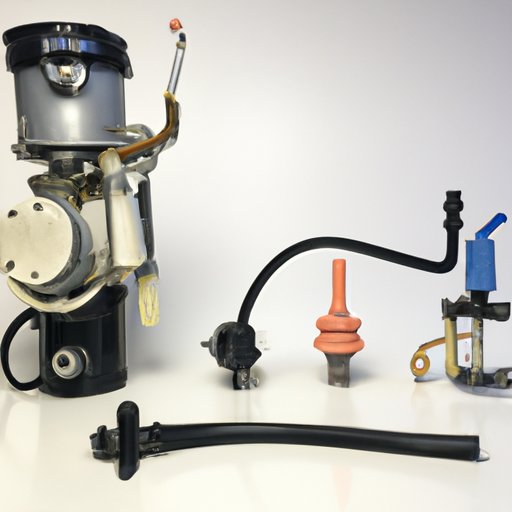Introduction
A fuel pump is one of the most vital components of an internal combustion engine. It is responsible for pumping fuel from the tank to the engine, where it is used to power the vehicle. In this article, we will explore how a fuel pump works, the different types available, their performance, and the components involved in a fuel pump system.

Anatomy of a Fuel Pump and How It Works
A fuel pump consists of several key components: an electric motor, a check valve, and a pressure regulator. The electric motor is powered by the car’s battery and is responsible for driving the fuel pump. The check valve prevents any backflow of fuel into the tank, while the pressure regulator helps maintain the fuel pressure in the system at a constant level.
When the ignition is switched on, the electric motor powers the fuel pump, which draws fuel from the tank through a suction line. The fuel then enters the fuel filter, where it is cleaned before entering the engine. From here, the fuel is delivered to the carburetor or fuel injectors, depending on the type of engine. The fuel is then mixed with air and burned in the cylinders to power the vehicle.
The pressure of the fuel in the system is regulated by the pressure regulator, which ensures that the fuel pressure remains constant. If the pressure drops too low, the fuel pump will be unable to deliver enough fuel to the engine, resulting in poor performance or engine stalling.

Different Types of Fuel Pumps and Their Operation
There are several types of fuel pumps available on the market, each designed to meet the needs of specific vehicles. The most common types are mechanical fuel pumps, electric fuel pumps, and mechanical/electric fuel pumps.
Mechanical fuel pumps are driven by the motion of the engine crankshaft and are typically found on older vehicles. They are relatively simple in design and require minimal maintenance. Electric fuel pumps are powered by the car’s battery and are found on newer vehicles. These pumps are typically more efficient and reliable than mechanical pumps but require more regular maintenance.
Mechanical/electric fuel pumps are a combination of both mechanical and electric fuel pumps. They are designed to provide the reliability of a mechanical pump with the efficiency of an electric pump. These pumps are often found on high-performance vehicles, as they are able to deliver higher fuel pressures than either mechanical or electric pumps alone.

Diagnosing a Faulty Fuel Pump and Troubleshooting
If your car is experiencing poor engine performance or stalling, it may be due to a faulty fuel pump. To diagnose a faulty fuel pump, you will need to check the fuel pressure in the system. This can be done using a fuel pressure gauge. If the fuel pressure is lower than normal, it is likely that the fuel pump is not functioning correctly.
Once you have determined that the fuel pump is the problem, there are several strategies you can use to troubleshoot the issue. First, check the fuel pump fuse and ensure that it is not blown. Next, inspect the fuel lines for any signs of damage or blockage. Lastly, if the fuel pump is still not functioning correctly, it may need to be replaced.
Components Involved in a Fuel Pump System
In addition to the fuel pump itself, there are several other components that make up a fuel pump system. These include the fuel filter, pressure regulator, fuel lines, and fuel tank. The fuel filter removes any impurities from the fuel before it enters the engine, while the pressure regulator helps to maintain a consistent fuel pressure throughout the system. The fuel lines carry the fuel from the tank to the engine, while the fuel tank stores the fuel until it is needed.
Performance of Various Fuel Pumps on the Market
The performance of a fuel pump depends on several factors, including the type of fuel pump, the quality of the components, and the condition of the fuel lines. Generally speaking, electric fuel pumps tend to be more efficient and reliable than mechanical fuel pumps, while mechanical/electric fuel pumps offer the best of both worlds. Additionally, high-quality components and well-maintained fuel lines will help ensure optimal performance.
Conclusion
Understanding how fuel pumps work is essential for proper maintenance and repair of a vehicle. By understanding the anatomy of a fuel pump, the different types available, and the components involved in a fuel pump system, you can ensure that your vehicle is running efficiently and reliably. Additionally, researching the performance of various fuel pumps on the market can help you select the best option for your vehicle.
(Note: Is this article not meeting your expectations? Do you have knowledge or insights to share? Unlock new opportunities and expand your reach by joining our authors team. Click Registration to join us and share your expertise with our readers.)
